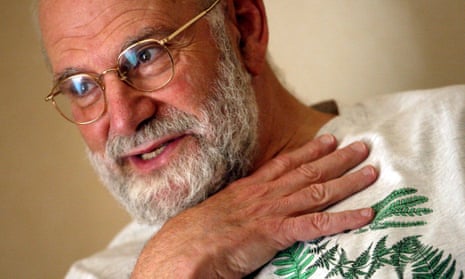One March in the mid 1990s I checked into a cheap hotel in Helsinki. I dropped my bag on the floor and, wondering what Finnish daytime television was like, switched on the TV. A darkened room with a dining table came into focus, and around it were six people having a conversation. To my surprise, all were speaking English, then a face I knew filled the screen – it was Oliver Sacks. Then another, Stephen Jay Gould, and another, Daniel Dennett. I had books by all three. It was snowing outside, and Helsinki seemed suddenly less inviting; I sat down on the bed and began to watch.
A Dutch TV company had assembled these men, together with Freeman Dyson, Stephen Toulmin and Rupert Sheldrake, for the round-table finale of a documentary series on science and the meaning of life. The series, A Glorious Accident, didn’t seem to have invited any women to take part but even so I watched it to the end – three hours later. The participants’ areas of expertise were diverse: biology, physics, palaeontology, neuroscience, philosophy. As the only practising clinician, Sacks made perceptive and valuable contributions – and was clearly having fun. I was just starting out in medicine, and it was a relief to see how a lifetime in clinical practice offered insights still relevant across the sciences.
Sacks died two years ago in August. A melanoma of the eye, diagnosed nine years earlier, had recurred and metastasised to his liver. The New York Times had referred to Sacks as the “poet laureate of medicine”, and carried an obituary that said that neurological conditions were for him occasions “for eloquent meditations on consciousness and the human condition”. In his last year he put the finishing touches to a memoir (On the Move), and completed some final magazine essays collected soon after his death (Gratitude). In one of his last newspaper pieces he wrote: “I have several other books nearly finished.” We might expect further posthumous essay collections to be on the way.
Millions of Sacks’s books have been printed around the world, and he once spoke of receiving 200 letters a week from admirers. For those thousands of correspondents, The River of Consciousness will feel like a reprieve – we get to spend time again with Sacks the botanist, the historian of science, the marine biologist and, of course, the neurologist. There are 10 essays here, the majority published previously in the New York Review of Books (the collection is dedicated to its late editor Robert Silvers). Their subject matter reflects the agility of Sacks’s enthusiasms, moving from forgetting and neglect in science to Freud’s early work on the neuroanatomy of fish; from the mental lives of plants and invertebrates to the malleability of our perception of speed.
The essay on speed has some characteristic flourishes: of Parkinson’s disease, Sacks writes that “being in a slowed state is like being stuck in a vat of peanut butter, while being in an accelerated state is like being on ice”. He is as good on near-death experiences: “There is an intense sense of immediacy and reality, and a dramatic acceleration of thought and perception and reaction.” Sacks has a Jain-like reverence for insects, and delights in comparative neuroanatomical facts: an octopus may have six times more neurons than a mouse; many plants possess nervous systems that move at a thousandth the speed of our own.

Plagiarism troubled Sacks, and an essay on memory dovetails with one on creativity, examining how someone can copy another’s work through unconscious repatternings of memory. “Memory arises not only from experience,” he concludes, “but from the intercourse of many minds.” He quotes the letters between Mark Twain and Helen Keller on plagiarism, and his own correspondence with Harold Pinter (whose play A Kind of Alaska was inspired by Sacks’s Awakenings). Most of his books are mentioned in passing, and the chosen essays stand as a kind of testament or gazetteer to their range. Reading them, I was reminded of something Annie Dillard said about the essay form: “The essay is, and has been, all over the map. There’s nothing you cannot do with it; no subject matter is forbidden, no structure is proscribed.”
Some of the slighter pieces here suffer from being placed between more substantial work, and in one, only one, Sacks’s argument loses coherence. But even then I was conscious of the great premium he placed on flights of ideas: “If the stream of thought is too fast, it may lose itself, break into a torrent of superficial distractions and tangents, dissolve into a brilliant incoherence, a phantasmagoric, almost dreamlike delirium.”
Sacks was deliriously in love with details – to the irritation of his editors – and he crammed his books with them. When the text couldn’t take any more, he spilled them over to the bottom of the page. It’s in the footnotes that his treasures are often to be found: in a two-page footnote to his essay “Scotoma: Forgetting and Neglect in Science”, Sacks outlines how urgent is the need for reconciliation between psychiatry and neurology, divided now for nearly a century. A “scotoma” is a blind spot in the vision, an area of darkness conjured by irregularities in brain or retinal function:
If one looks at the charts of patients institutionalized in asylums and state hospitals in the 1920s and 1930s, one finds extremely detailed clinical and phenomenological observations, often embedded in narratives of an almost novelistic richness and density ... this richness and detail and phenomenological openness have disappeared, and one finds instead meagre notes that give no real picture of the patient or his world.
Through the course of the 20th century, the US Diagnostic and Statistical Manual of Mental Disorders (a book conceived to facilitate health insurance billing) has, Sacks insists, impoverished clinical language. “Present-day psychiatric charts in hospitals are almost completely devoid of the depth and density of information one finds in the older charts, and will be of little use in helping us to bring about the synthesis of neuroscience with psychiatric knowledge that we so need.” Earlier in the book he singled out one of the defining moments of that schism, when in 1893 Freud gave up looking for elements of brain pathology that might be relevant to mental health: “The lesion in hysterical paralyses must be completely independent of the nervous system,” Freud wrote, “since in its paralyses and other manifestations hysteria behaves as though anatomy did not exist or as though it had no knowledge of it.”
We’re still suffering the consequences of that schism: neurological dualism is alive and well. It’s estimated that around a third of patients referred to neurological clinics have no “lesion” that tests or scans can identify. But their problems are not “all in their head” – that catch-all, meaningless phrase that to many implies malingering or hypochondria. Functional illness is neither, and modern psychiatry no less than neurology is tragically ill‑equipped to deal with it. In that Helsinki hotel room I saw Sacks break out of the silos of his training, and offer a more humane vision of what communion between the specialties might bring. Two years after his death, he’s still reminding us that a unified vision is long overdue.

Comments (…)
Sign in or create your Guardian account to join the discussion